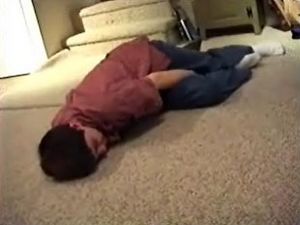Hypersomnia facts for kids
Hypersomnia is a medical condition that makes people feel unusually sleepy. It's like feeling tired all the time, even after a full night's sleep. People with hypersomnia might fall asleep easily during the day. This can happen at school, during activities, or even while talking. This condition is different from insomnia, where people have trouble falling asleep or staying asleep at night. Hypersomnia is a type of sleep disorder.
Contents
What is Hypersomnia?
Hypersomnia means "too much sleep." If you have hypersomnia, you might feel very sleepy during the day. You might also need to sleep for a very long time at night. Even after sleeping for many hours, you could still wake up feeling tired. This constant sleepiness can make it hard to focus in school or enjoy your hobbies.
How Common is Hypersomnia?
About five out of every 100 people, or one in twenty, experience hypersomnia. It can affect anyone, but it's often seen in people who have other health issues. For example, many people with Sleep apnea also suffer from hypersomnia. Sleep apnea is a condition where a person stops breathing for short periods during sleep. Hypersomnia can also be linked to mood disorders, which affect how a person feels emotionally.
Types of Hypersomnia
Doctors usually divide hypersomnia into two main types: primary and secondary. This helps them understand what might be causing the sleepiness.
Primary Hypersomnia
When hypersomnia is caused by a problem with the brain or nervous system itself, it's called primary hypersomnia. These types are quite rare. A well-known example of primary hypersomnia is Narcolepsy. People with narcolepsy can suddenly fall asleep at any time, even in the middle of an activity. They might also experience sudden muscle weakness when they feel strong emotions.
Secondary Hypersomnia
Secondary hypersomnia happens when the extreme sleepiness is a symptom of another health condition. This type is much more common. For instance, if someone loses consciousness because of epilepsy, they might feel very sleepy afterward. As mentioned before, sleep apnea is one of the most common causes of secondary hypersomnia. Some medicines can also make people feel very sleepy, leading to secondary hypersomnia.
Living with Hypersomnia
Dealing with hypersomnia can be challenging. It can make daily life difficult, affecting schoolwork, friendships, and family time. However, there are ways to manage the condition. Doctors can help figure out the cause of the sleepiness. They might suggest changes to your sleep habits or recommend specific treatments. Getting enough good quality sleep and following a regular sleep schedule can often help.
See also
 In Spanish: Hipersomnia para niños
In Spanish: Hipersomnia para niños


